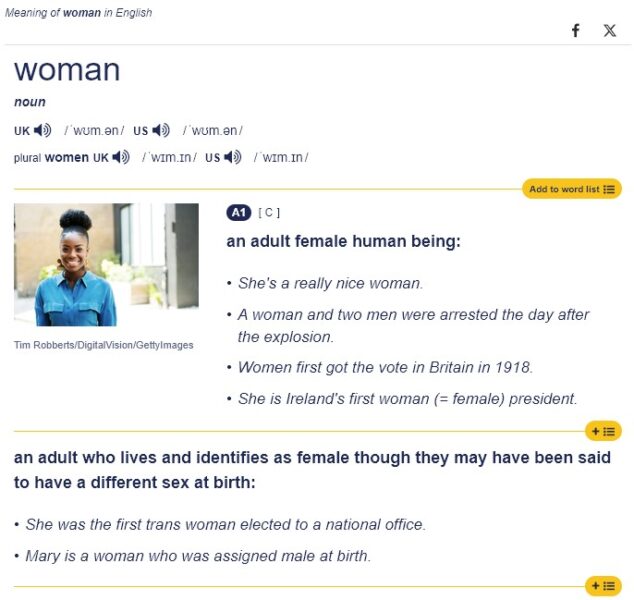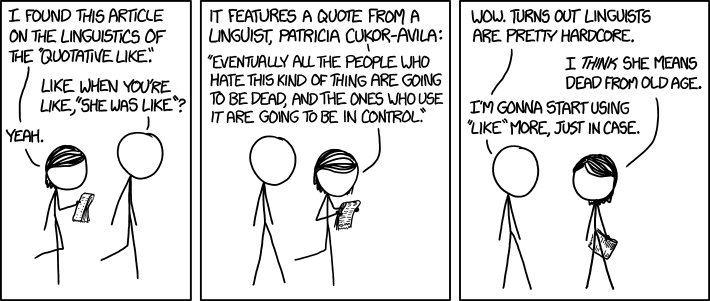Linguists are famously very cool with words changing their meaning, new words arising, and basically language just doing whatever the hell it wants, irregardless (heh) of what the language pedants would prefer.
‘That’s not what the dictionary says!’, the pedant bleats.
‘Ah’, retorts the wise linguist, ‘but a dictionary is simply a record of usage, not a rule book’.
Fun fact by the way:
The earliest English dictionaries in the early 1600s, like Robert Cawdrey’s Table Alphabeticall, didn’t actually list all the words, only the most difficult ones, including the rush of words being borrowed into English from French, Latin and Greek – which were much more scientifically and culturally interesting back then than boring old backwater English.
Dictionaries change
Contemporary dictionaries do change their definitions, as language itself changes. Take the English words shall and will, which used to occupy very different territories (for example shall typically appeared before ‘I’ and ‘we’, will after other grammatical subjects) but nowadays will has largely usurped shall. That’s just natural language change, and the Cambridge English Dictionary now marks shall as ‘old-fashioned’. Will is hot; shall is not.
And this is still happening today. In 2019, a petition was launched for the Oxford English Dictionary to update its definition of ‘woman’, to remove various sexist wording and to include “examples representative of minorities, for example, a transgender woman, a lesbian woman, etc.”. This caused quite a stir at the time, but the dictionary folk did what they always do – investigated changing language usage.
The Cambridge Dictionary moved first, adding an entry to its definition ‘an adult who lives and identifies as female though they may have been said to have a different sex at birth’. The OED has also moved but rather more circumspectly, simply adding an example of usage under its definition, ‘Having trans women involved added so much to the breadth of understanding what it means to be a woman.’ In this case we’re witnessing dictionaries catching up in real time, at different paces. But they do catch up. That’s their job, not telling us how to speak proper!
Prescriptivists and descriptivists
In academic parlance, those who wish language would just sit still and behave itself are prescriptivists. They prescribe how language should be used (just as your doctor prescribes the medicines you should take).
Linguists, by contrast, are descriptivists, simply describing language as it is actually used without passing judgement.
Or are they?
And/or, do they have to always be?
Naming no names, I have heard unguarded comments from professional linguists, irked by this or that slang term their teenage offspring come out with. Linguists are humans, and they live in human society that is full of that kind of sneering. Some of it slips through. But strictly speaking this is very much the faux pas, and might provoke a subtle change of subject at the conference dinner table.
Quotative like
A widely discussed example from recent decades is a new use of like to quote someone (‘He was like, I don’t care!’). I reviewed and modelled the research into this new ‘quotative like’, which showed teenagers leading the innovation. This new usage quickly ruffled pedant feathers far and wide. Indeed, many schoolteachers heavy-handedly banned its use under the pretence of reinforcing standard literacy. ‘You’ll never get a job speaking like that!’ etc. etc.
But the linguistic research told another story. Quotative like was doing something very special, and more importantly something previously unavailable in English. It allowed you to relate what someone said, but without claiming those were the precise words they used. Compare ‘He was like, I don’t care’ and ‘He said, I don’t care’. The first is a less explicit claim that he said exactly that, simply that he said something like that.
It’s actually a very efficient and strategic conversational device; and linguists sprung to its defence as a novel and intriguing innovation. For those few linguists who continued to privately grumble about it, and other youth lingo, eyebrows were increasingly raised.
Evasive so
But other linguistic innovations garner more divided opinion among linguists, particularly some quirks of politicians, corporate bigwigs, and other denizens of elite circles. A widely discussed example which gained pace in the early 2010s is the use of the word so to begin a sentence. Historically a rather dull grammatical bolt simply plugging together chunks of sentences, this unassuming two-letter word has been promoted to higher tasks in recent years, much to the dismay of the pedants. As a 2015 NPR article notes,
Many of the complaints about sentences beginning with “so” are triggered by a specific use of the word that’s genuinely new. It’s the “so” that you hear from people who can’t answer a question without first bringing you up to speed on the backstory. I go to the Apple Store and ask the guy at the Genius Bar why my laptop is running slow. He starts by saying, “So, Macs have two kinds of disk permissions …”
British journalist and BBC radio presenter John Humprys long marshalled opinion against this use of so. Indeed his listeners frequently echoed the same grumble. Others went on the defensive, urging that so has been used to begin sentences for centuries.
But that defense somewhat misses an important nuance of this irritation. The new usage here is not simply beginning a sentence, but beginning a reply to a question, especially a challenging question, often with something that is not really an answer at all, and often uttered by someone in a position of power, who really should know the answer.
A famous example of that little nuance was a 2015 New York Times interview of Mark Zuckerberg in which he gibbered out some bizarrely rambling answers to very straightforward questions, for example what his new toy ‘Creative Labs’ was supposed to be. Simple question. Define the product. He responded:
So Facebook is not one thing. On desktop where we grew up, the mode that made the most sense was to have a website, and to have different ways of sharing built as features within a website. So when we ported to mobile, that’s where we started — this one big blue app that approximated the desktop presence.
But I think on mobile, people want different things. Ease of access is so important. So is having the ability to control which things you get notifications for. And the real estate is so small. In mobile there’s a big premium on creating single-purpose first-class experiences.
So what we’re doing with Creative Labs is basically unbundling the big blue app.
This spectacularly circuitous response not only patronised a professional journalist and their audience – who might just understand what a website is – but it also did something more sinister. It shirked responsibility and accountability; it kicked up a cloud of corporate haze when a simple product definition was required.
Slippery circuitousness, after all, is an important corporate skill, whether you’re not answering a journalist or not answering a Senate committee.
One reactionary pedant, Bernard Lamb, President of the Queen’s English Society, retorted of this new so: “It’s not being used as a conjunction to join things up, which is how it should be used. … It’s just carelessness, it doesn’t have any meaning when used this way.”
But he was wrong. It does have meaning, just in a new and rather more sinister way.
Doing bad things with words
‘So’, as it’s used here and in other such corporate media interviews (‘How can you justify this kind of oil spill?’ – ‘So oil spills are uncommon and we work very hard to prevent…’) is doing a huge amount of ultimately rather grubby work. Its former career as a conjunction (‘X happened so Y happened’) conditions us to see logical relevance between X and Y. Zuck and other corporate and political bigwigs use this to their advantage, to imply relevance when there is none.
And in the process, in a small but important way, that adds to their aura of elite untouchability.
Powerful people using language to trick their audiences is of course not new. Classical rhetoric gives us the term paradiastole, when a reply to a question turns a negative into a positive, or otherwise deflects and diffracts the focus of the question. (Socrates famously hated political rhetoric, inspiring his student Plato similarly.) Reply-initial so could simply be the new rhetorical kid on the block, the latest ruse in a very long tradition of ruses to distract from not having a good answer, or having one but wanting to avoid it.

Statues of Plato (left) and Socrates (right) by Leonidas Drosis at the Academy of Athens (Wikimedia Commons, CC-BY-SA-4.0)
And this brings us to where linguists might get justifiably annoyed, more so than at their teenage kids’ slang.
If a linguistic innovation is achieving something sinister, then perhaps it’s ok to hate on it. Linguists, after all, are not simply interested in sanctifying any and all words as precious gems. Linguists skillfully dissect other language use that is more obviously doing bad things – racist, sexist, homophobic and transphobic, and other discriminatory discourse.
Calling out nefarious language is ok
Laying bare when a linguistic innovation is doing something sinister, calling it out for what it is, can simply be an extension of that same important critical insight.
Funnily enough, that reply-initial so has actually been picked up by media training organisations. Corporate elites are always carefully groomed on their language, and since this particular innovation has picked up so much ire, it is now carefully ironed out. You may be hearing it less nowadays as a result.
You’ll still hear ‘I was like…’ though, because teenagers don’t have spin doctors to manage their comms, nor are they interested in fooling the public to buy their widgets or vote for them. Their interest is in being cool, as it should be.
So, criticising linguistic innovations does have its place when there are more shady forces at work. It’s like the principle in comedy that a joke is funny as long as it’s ‘punching up’, i.e. poking fun at those higher on the social ladder. As soon as the jokes begin ‘punching down’, mocking those who are already looked down upon without a comedian piling in, then it’s veering towards criticism.
New words can be fun and useful, or they can hide other more nefarious intentions. For the latter, linguists should feel comfortable punching up. It’s part of the job, alongside calling out more obviously discriminatory language. Linguists are ideally placed to pick those apart – celebrating the grammatically ingenious irreverence of teens while also throwing tomatoes at sneaky elites. So there.








 This work is licensed under a
This work is licensed under a
The article brings up a few interesting points about the way words can be played with when put into sentences, which also reflects how society’s willing to use language as a type of behavior prop: your vocabulary might make you cool or make you sound quite boring.
Personally, as someone who doesn’t have English as their first language, getting reminded of how the way I speak may sound “unusual” or simply “wrong” from a grammar point of view is always a big deal, because I truly think that there are so many other social topics which should be addressed more often. Also, not forgetting how powerful language can be (specially when it comes to taking advantage of the world’s needs and most of its population’s — who are not in control) is really important. Loved reading this and learning a little more about everything, really enjoyed the given examples as well! I will surely stay tuned and research more about this topic.
So this article, interesting though it is, is happy to ignore almost all the work done in Critical Discourse Analysis, to avoid talking about harmful euphemisms like “mowing the lawn” for genocide, or to think deeply about how the empathy hierarchy normalises clauses with human subjects exercising power over passive “environmental” objects, or even how the very word “environment” anthropocentrically marginalises our ecology???
I think your observations go beyond the scope of the original post. Euphemisms have been used to hide atrocities since time immemorial. In an often horrific way they exemplify the inventiveness of human language. Dave’s post is about an entirely different subject, having to do with the continually changing fashions of everyday discourse and reactions to them. Dave is right to point out that linguistics is a descriptive science, not a prescriptive one (if a science can ever be prescriptive), while at the same time as language lovers we can’t help taking offence sometimes about what we perceive as abuse of the object of our affection. What you are talking about Andrew is in many cases a deliberate abuse of language intended to deceive and cover up non-linguistic atrocities. I have been reading “How to Win an Information War: the propagandist who outwitted Hitler” by Peter Pomerantsev, about the master of British WW2 propagandist Delmer Sefton. I highly recommend it to anyone interested in the weaponisation (ugh!, another neologism!) of language.
So interesting! I’m glad to be made aware of the more nefarious use of reply-initial “so”. My association with reply-initial “so” is the one mentioned first (in the quote), which is usually neutral. I use it when students ask a question which requires an answer with context or something like that, or the more informal getting up to speed with a backstory. It is often preceded by “okay”, as in “okay, so…” which doesn’t change the meaning, I think? Anyway, happy to understand this construction better!
Fascinating, Dave. Many thanks for these observations.
I live in Indonesia and very rarely interact with English speakers. The BBC Radio 4 ‘Today’ programme is my main source of data about current developments in English. There are 2 which I have noticed recently:
1) A speaker (often a politician) beginning an answer to a question (usually from a BBC journalist) with ‘I mean …’ ‘I mean’ used to be the beginning of the speaker’s clarification of something they have already said but which has obviouslky not been fully understood. But in this new usage it obviously has nothing to do with clarifying what has already been said. Perhaps it approximates to ‘As far as I understand it, the situation is like this …’ But this is just a tentative suggestion; I am not convinced by my own proposal!
2) ‘gaslighting’ What is it? I have asked a couple of native speakers in the UK what it means and they both said that they weren’t sure. Something to do with misleading?
I think the meaning of gaslighting comes from the movie/film Gaslight, in which the character played by Charles Boyer tries to drive the character played by Ingrid Bergman mad.
This was a great post! Thoroughly enjoyed learning that half of my (“standard” American English) can be described as using the quotative like 😉. I also didn’t know that the reply-initial so had a name!
With reference to early English dictionaries, one of the best sources of Elizabethan (hence Shakespearean) English vocabulary can be found in the first Italian-English dictionary by John Florio, published under the title “A Worlde of Wordes” in 1598 with a 2nd edition in 1611 called “Queen Anna’s New World of Words”. Warning! some very very salty language in both editions.